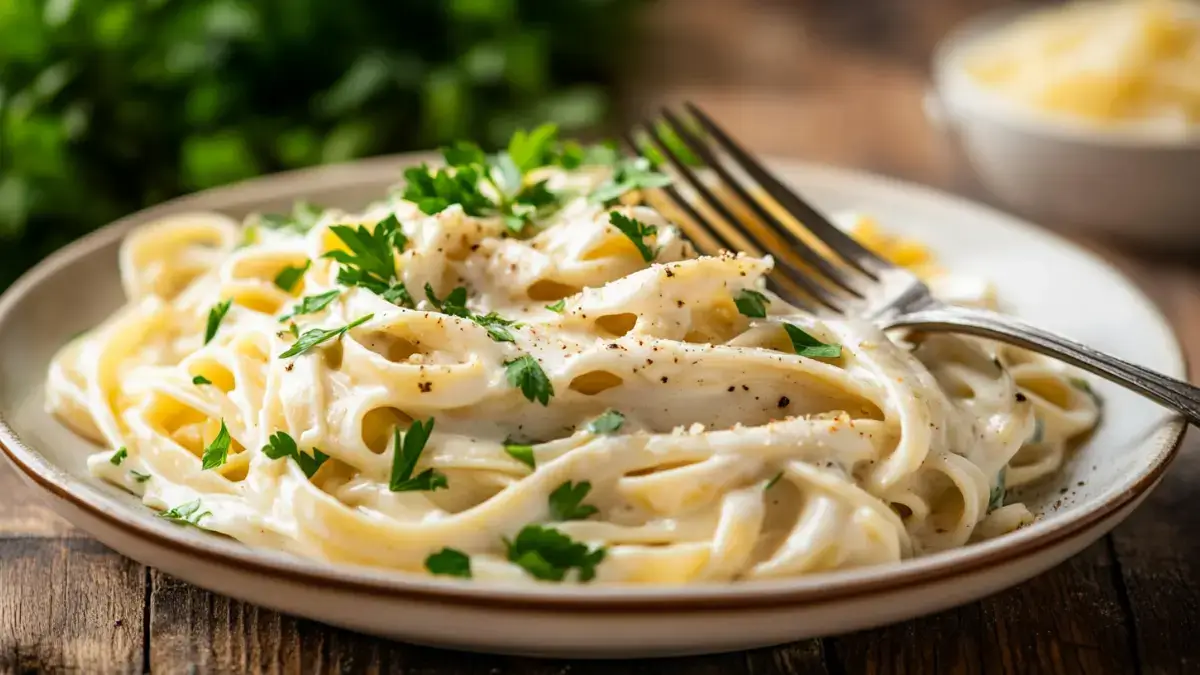If there’s one thing I absolutely love, it’s combining the rich, creamy goodness of Alfredo sauce with the bold, zesty flavors of Cajun cuisine. This Cajun Alfredo sauce recipe is a perfect fusion of two worlds—Italian comfort food and Southern spice—that creates a dish that’s nothing short of mouthwatering. If you’ve been searching for the ideal Cajun Alfredo sauce recipe to add to your collection, you’re in the right place. Whether you’re a seasoned cook or a kitchen newbie, this recipe is not only easy to make but also incredibly satisfying. rust me, once you’ve tried this, it will quickly become a go-to in your dinner rotation, just like these quick and versatile thin-sliced chicken breast recipes that are perfect for busy weeknights.
What is Cajun Alfredo Sauce?
Cajun Alfredo sauce is a delightful twist on the traditional Alfredo sauce we all know and love, and this Cajun Alfredo sauce recipe ensures you get the perfect balance of flavors. While classic Alfredo is rich and creamy, made with butter, heavy cream, and Parmesan cheese, adding Cajun seasoning transforms it into something extraordinary. The Cajun spices—a blend of paprika, garlic powder, onion powder, cayenne pepper, and other seasonings—bring a smoky, spicy kick that perfectly complements the creaminess of the sauce. It’s like a flavor explosion in every bite!
If you’re curious about how Cajun seasoning blends add such vibrant flavors to dishes, you can learn more about traditional Cajun seasoning blends to deepen your understanding. Similarly, if you’re interested in the history of Alfredo sauce itself, exploring its origins can provide fascinating insights into how this dish became such a beloved classic.
I often think of Cajun Alfredo as the best of both worlds. It has the comforting, indulgent qualities of Italian cuisine, but with the exciting, robust flavors that Southern cooking is known for. If you’re a fan of bold flavors and creamy sauces, you’re in for a treat. And to ensure your pasta is cooked to perfection, check out these tips for making the perfect pasta.
Ingredients for the Perfect Cajun Alfredo Sauce Recipe
When making this Cajun Alfredo sauce, using the right ingredients is key to getting that perfect balance of creaminess and spice. Here’s what you’ll need:
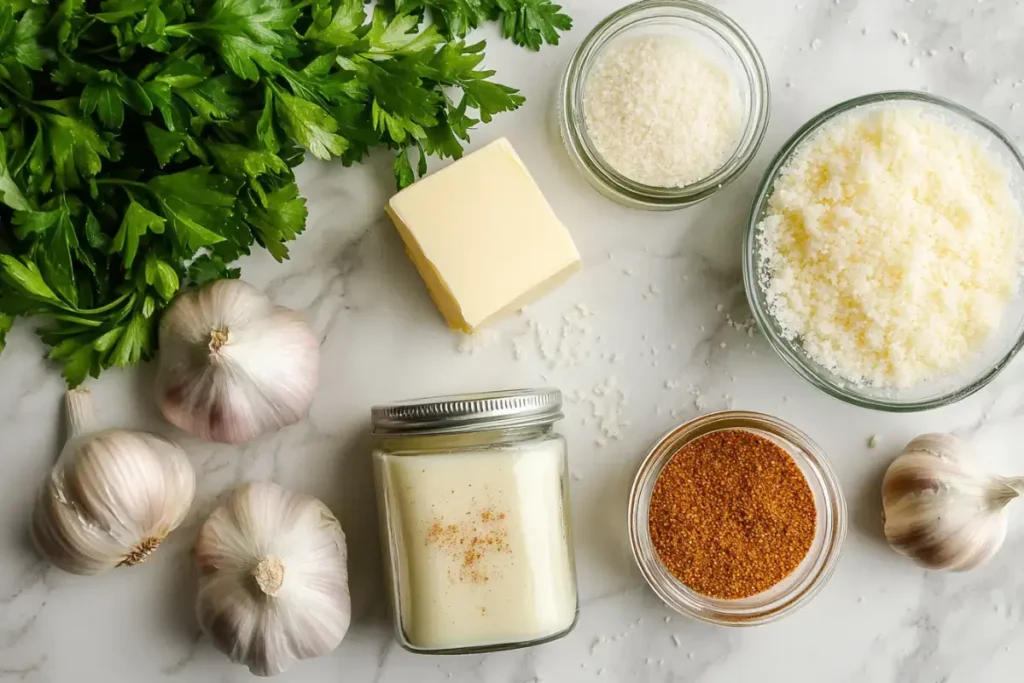
Essential Ingredients for Cajun Pasta Sauce
- Shallots: These add a mild, sweet onion flavor that blends well with the other ingredients. If you don’t have shallots, you can substitute them with a yellow onion.
- Fresh Garlic: Always go for fresh cloves instead of jarred garlic. It might take a bit more effort, but the flavor difference is worth it.
- Dry White Wine: This is my little secret ingredient. It helps to deglaze the pan, adding a subtle acidity that balances out the richness of the sauce. I usually go with a Sauvignon Blanc or Chardonnay—whatever I have on hand.
Dairy Components
- Unsalted Butter: I prefer using unsalted butter so I can control the salt level, especially since Cajun seasoning can vary in saltiness.
- Heavy Whipping Cream: This is non-negotiable for me. It creates the luxurious, silky texture that makes Alfredo sauce so irresistible. You could substitute it with half-and-half for a lighter version, but it might not be as indulgent—similar to how this sourdough sandwich bread recipe offers a healthier twist on a classic.
- Parmesan Cheese: Freshly grated Parmesan is a must. Pre-grated cheese often contains anti-caking agents that can affect the texture of your sauce. If you can, buy a block and grate it yourself—trust me, it makes all the difference.
Seasoning and Garnishes
- Cajun Seasoning: You can use a store-bought blend, but I prefer to make my own Cajun seasoning at home. This way, I can adjust the heat and salt levels to my liking. Start with a little and add more to taste—you don’t want to overwhelm the dish.
- Fresh Parsley: This isn’t just for garnish. Fresh parsley adds a bright, fresh note that lightens up the heaviness of the sauce. If you don’t have parsley, green onions or chives are good alternatives.
Pasta Selection
- Pasta: I usually go with fettuccine, but linguine or penne works just as well. The key is to use a pasta shape that can hold onto the sauce.
How to Make the Best Cajun Alfredo Sauce Recipe: Step-by-Step Cooking Instructions
Making a delicious Cajun Alfredo sauce recipe from scratch might sound daunting, but it’s actually quite simple. Here’s how I do it:
Preparing the Ingredients
- First, set a large pot of salted water to boil. Cook your pasta to al dente according to the package instructions. Make sure to reserve about a cup of pasta water before draining—it’ll help you adjust the sauce consistency later.
- While the pasta is boiling, chop the shallots, mince the garlic, and grate the Parmesan cheese. I like to have all my ingredients ready before I start cooking the sauce, so I’m not scrambling to chop something while the butter’s burning!
Cooking the Sauce
- In a large sauté pan, melt 2 tablespoons of butter over medium-low heat. Once melted, add the chopped shallots and a pinch of salt. Sauté them until they turn translucent—this should take about 3 minutes.
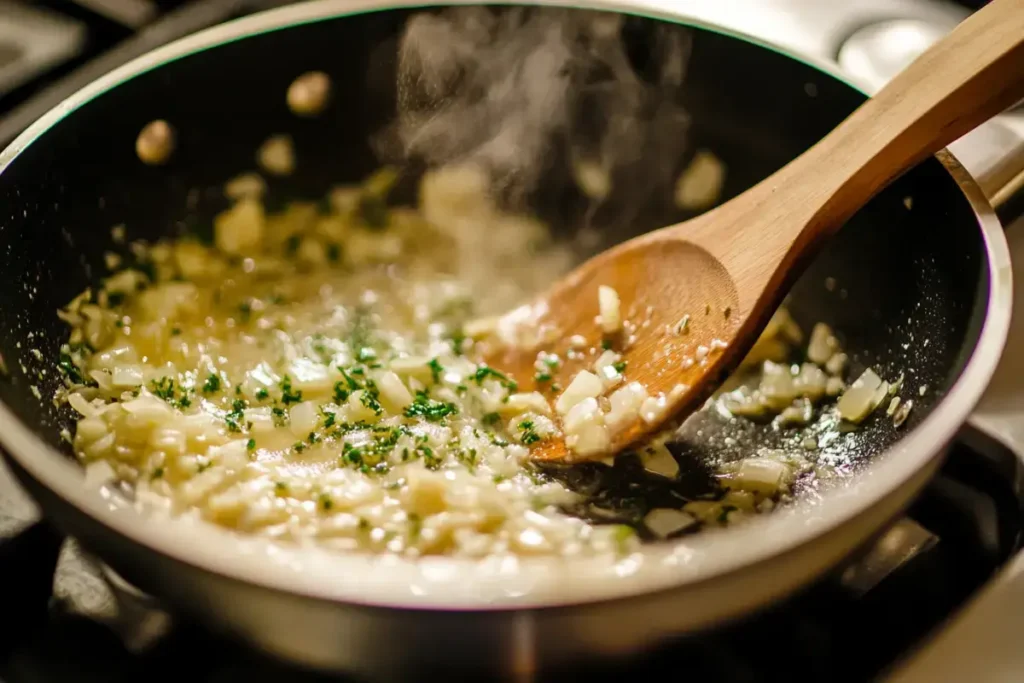
- Next, add the minced garlic and cook until it’s fragrant, which usually takes about 30 seconds. Be careful not to burn the garlic, as it can turn bitter.
- Pour in the dry white wine to deglaze the pan, scraping up any brown bits stuck to the bottom. Let the wine simmer for a few minutes until most of the alcohol has evaporated. This step adds a layer of flavor that’s both subtle and complex.
Adding the Cream and Cheese
- Add the remaining butter to the pan and let it melt completely. Then, whisk in the heavy whipping cream, Parmesan cheese, and Cajun seasoning. Keep the heat on low to prevent the sauce from separating.
- Let the sauce simmer gently for a few minutes until it thickens to your desired consistency. This is where the magic happens—the cream thickens, the cheese melts, and the Cajun spices infuse the sauce with their bold flavors.
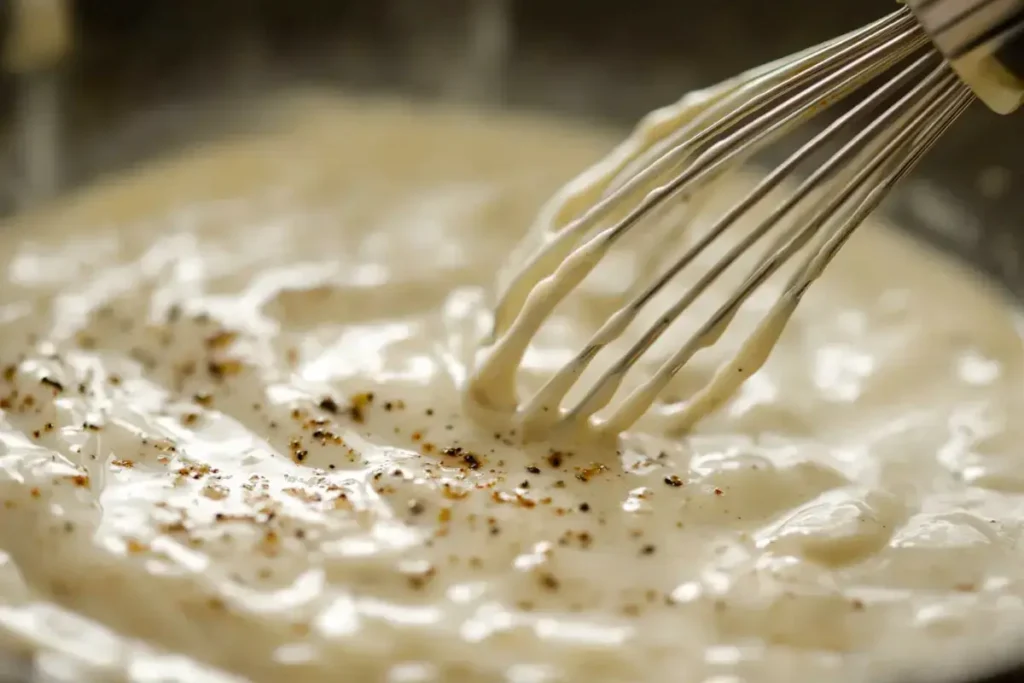
- Stir in the chopped parsley and remove the pan from heat. Taste and adjust the seasoning if needed. I usually add a bit more Parmesan and Cajun seasoning at this point, depending on how it’s tasting.
Tossing the Pasta
- Add the cooked pasta to the sauce, along with a splash of the reserved pasta water. Toss everything together until the pasta is evenly coated with the sauce. The pasta water helps the sauce cling to the noodles and adds a bit of extra silkiness.
Serving the Cajun Alfredo
- Serve the pasta warm, topped with additional grated Parmesan and a sprinkle of fresh parsley. If you’re feeling extra indulgent, add some blackened chicken or shrimp on top for a complete meal.
Tips and Tricks for the Best Cajun Alfredo Sauce
Making the perfect Cajun Alfredo sauce is easier than you might think, especially when you have a few tips and tricks up your sleeve. Over the years, I’ve learned a thing or two about getting that creamy, flavorful sauce just right, and I’m excited to share these insights with you.
Avoiding Common Mistakes
- Curdling or Separating: One of the most common issues when making Alfredo sauce is curdling or separating. To prevent this, make sure to keep the heat on low when adding the heavy cream and Parmesan cheese. High heat can cause the fat to separate from the liquid, which isn’t what you want in a creamy sauce.
- Over-Spicing: It’s easy to get carried away with the Cajun seasoning, but remember that a little goes a long way. Start with a small amount, taste as you go, and add more if needed. This ensures that the flavors are balanced and not too overwhelming.
Pro Tips
- Fresh Ingredients Make a Difference: Using fresh garlic, freshly grated Parmesan, and homemade Cajun seasoning can elevate the flavor of your sauce to a whole new level. I always keep these ingredients on hand because they truly make a difference in the final dish.
- Simmering Slowly: Patience is key when making Alfredo sauce. Letting the sauce simmer slowly allows the flavors to meld together beautifully, resulting in a richer, more cohesive dish.
Variations and Customizations
One of the things I love most about this Cajun Alfredo sauce recipe is how versatile it is. You can easily customize it to suit your preferences or switch things up depending on what you have on hand.
Lightening Up the Sauce
- If you’re looking to lighten up this dish, you can substitute half-and-half for the heavy cream, much like how I tweak recipes like this goulash recipe with both traditional and modern variations. It won’t be as rich, but it’s still delicious and creamy. Another option is to use zucchini noodles instead of pasta for a low-carb alternative that’s just as satisfying.
Cajun Alfredo with Different Proteins
- Cajun Chicken Alfredo: This is probably my favorite variation. I like to season chicken breasts with Cajun seasoning, then pan-fry them until they’re golden brown. Slice the chicken and serve it on top of the pasta—it adds a wonderful protein boost and extra flavor.
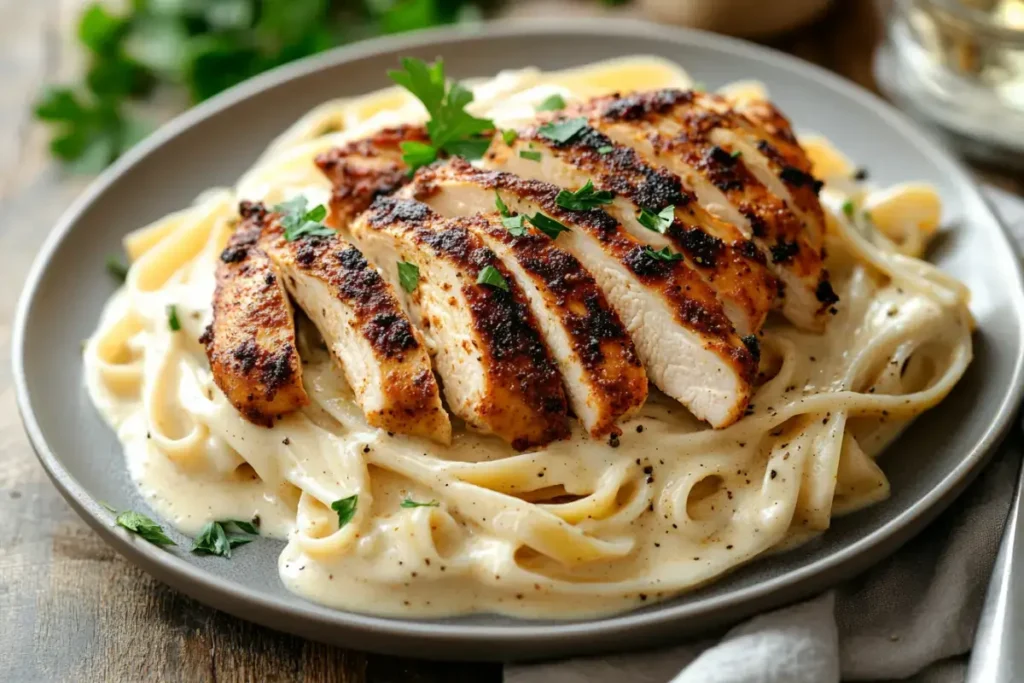
- Cajun Shrimp Alfredo: If you’re a seafood lover, this one’s for you. Simply season shrimp with Cajun spices and cook them in butter until they’re just done. Toss them into the pasta right before serving for a luxurious, seafood twist.
- Andouille Sausage Alfredo: For a truly authentic Cajun experience, try adding Andouille sausage to the mix. The smoky, spicy sausage pairs perfectly with the creamy sauce, making for a hearty, satisfying meal.
Storing and Reheating Leftovers
If you’re anything like me, you’ll want to make a big batch of this Cajun Alfredo sauce to enjoy later. Here’s how to store and reheat it to ensure it stays just as delicious as when it’s fresh.
Storing Leftovers
- Store the pasta and sauce separately if possible. This prevents the pasta from soaking up too much sauce and becoming mushy. Keep them in airtight containers in the refrigerator for up to 3-4 days.
Reheating Tips
- When you’re ready to reheat, the best method is to warm the sauce in a nonstick saucepan over medium-low heat. Add a splash of water or milk to help loosen the sauce as it heats, and stir frequently to prevent it from sticking or separating. Avoid microwaving if possible, as it can cause the sauce to break.
- If you’ve stored the pasta and sauce together, you can reheat them in the same saucepan. Just be sure to add a little extra liquid to keep the sauce smooth and creamy.
Frequently Asked Questions (FAQs)
When it comes to making Cajun Alfredo sauce, I’ve noticed that a few questions tend to come up repeatedly. Here are some FAQs that might help you out:
- How to thicken Cajun Alfredo sauce?
- If your Alfredo sauce is too thin, the simplest solution is to let it simmer for a few extra minutes. The heat will cause the liquid to reduce, thickening the sauce naturally. Alternatively, you can whisk a small amount of flour or cornstarch with a bit of water to create a slurry, then add it to the sauce and cook for a couple more minutes until it thickens.
- Can I make this sauce ahead of time?
- Absolutely! While Alfredo sauce is best served fresh, you can make it ahead of time and store it in the refrigerator for a day or two. When you’re ready to serve, reheat it gently on the stovetop with a little added liquid to restore its creamy texture.
- Is Cajun Alfredo Sauce gluten-free?
- The sauce itself is gluten-free, as it’s made with heavy cream, Parmesan cheese, and spices. Just be sure to use gluten-free pasta if you’re serving it to someone with gluten sensitivities.
- Can I freeze Cajun Alfredo Sauce?
- While technically you can freeze Alfredo sauce, I don’t recommend it. The sauce tends to separate when thawed, losing its creamy consistency. If you do freeze it, be prepared to whisk it vigorously while reheating to bring it back together.
Conclusion
There you have it—a complete guide to making the best Cajun Alfredo sauce you’ve ever tasted. This dish is perfect for a cozy dinner at home, impressing guests, or just treating yourself to something special. Whether you stick to the classic recipe or try one of the variations, I’m confident you’ll love the combination of rich, creamy Alfredo sauce with the bold, spicy flavors of Cajun seasoning.
Now that you know all my tips and tricks, it’s time to get cooking! I can’t wait for you to try this recipe and experience the deliciousness for yourself. And don’t forget to share your results with me—I’d love to hear how it turns out. Happy cooking!

